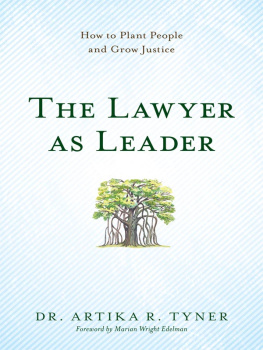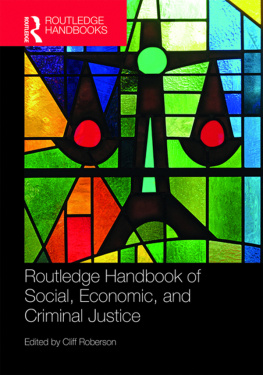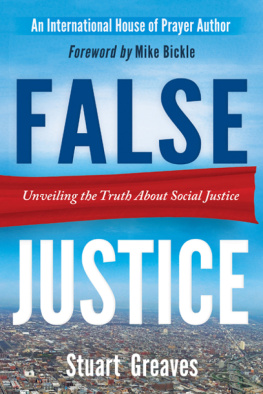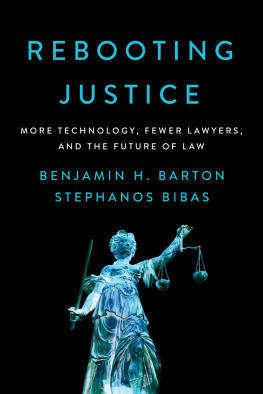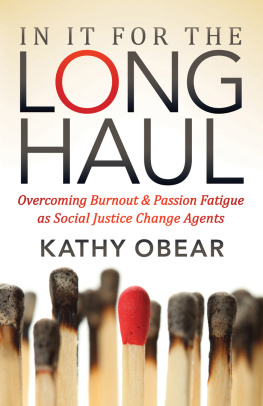Advance Praise
Dr. Tyner offers us a thoughtful and enlightened view of the role of the lawyer as agent of social change. Focusing on four lawyer-leaders who have inspired change and inspired others to work for change, she shows us an optimistic way for lawyers to lead in their service as the gatekeepers of social justice. Acknowledging the depth and breadth of societys problems, she advocates for lawyers to be trained to be leaders and to lead in the resolution of issues that otherwise seem intractable.
Sarah Redfield
Professor of Law
This work is a significant contribution to the education of lawyers as leaders of change for social justice. Building on the principles of authentic and shared leadership, the book highlights the importance of lawyers fulfilling their ethical responsibility, leading from wherever and whoever they are. Similar to what is happening in the engineering profession, this work is at the forefront in filling a gap in leadership development for lawyers that is timely and crucial to the responsibilities of the profession.
Ronald J. Bennett, PhD
Founding Dean & Professor Emeritus of Engineering, University of St. Thomas
Artika Tyners book is a call to action. The action she seeks is a fresh, rethinking of legal training. Tyner describes a New Social Justice Lawyering, which articulates a vision of legal education that recognizes a primary role for leadership development in law school curriculum. The kind of leadership she describes empowers people in our communities whose voices go unheard. Empowering marginalized people requires community organizing skills, and the kind of communication skills that can discover community wisdom, and mobilize the communitys assets in support of positive social change. This book provides guidance for developing these and other critical skills in lawyers dedicated to social justice.
If we want to live out the greatest promises of democracy, then our definition of leadership must transcend the limiting notion that it is just positional, or that it is part of some zero-sum equation where some people are leaders, and others are not. Because attorneys practice their craft within the system, it is often difficult to think of them as change agents whose skills and talents can be dedicated to dismantling systems. The re-imagining of institutions requires collaborative leadership skills, not just technical knowledge used to assist clients when they need to lawyer up. Lawyer as Leader recognizes this, and offers a good roadmap for legal education for those who want to be involved in creating transformative change in the world.
John Hamerlinck
Associate Director at Minnesota Campus Compact
This book speaks to lawyers whose passion for social justice will be ignited so that they can be true leaders of social change. Professor Tyner not only gives us the vision for becoming effective social justice leaders but speaks to our souls to empower us to take those first steps to serve and transform communities.
H. Wesley Sunu
Attorney at Law, Tribler Orpett & Meyer P.C.
The Lawyer as Leader: How to Use Your Legal Skills to Plant People and Grow Justice is a young lawyers practical vision for empowering lawyers to stand in the great legal traditions of Gandhi and Mandela to motivate systematic change. It is a passionate call for the development of coursework in law schools and continuing education curriculum to train lawyers on the fundamentals of leadership that will target critical issues of justice. Dr. Tyners work is foundational and necessarynot only for the practice of law but that of a more just society.
Kao Kalia Yang
Author, The Latehomecomer: A Hmong Family Memoir
The law is often viewed as an obstacle to justice by change agents and activists. In this groundbreaking book Dr. Artika Tyner argues that this need not be the case and that lawyers are often leaders of social movements. Through profiles of four social justice lawyers Dr. Tyner explores how insights from leadership theory can help us envision the practice of social justice lawyering. This is a crucially important book that will be welcomed by change agents and educators everywhere.
Stephen Brookfield
John Ireland Endowed Chair, University of St. Thomas, Minneapolis-St. Paul, Co-author Learning as a Way of Leading: Lessons from the Struggle for Social Justice
The Lawyer as Leader: How to Use Your Legal Skills to Plant People and Grow Justice is a very powerful readinspiring, empowering, motivating, immediately useful and applicable across business sectors and professions. This book addresses what leaders today and in the future can employ to develop others as well as develop his/her self. A must-read for anyone passionate about promoting social change!
Debra A. Lindh, Ed.D,
President and Founder, Mindful Effect, LLC
When leadership, a passion for service and a passion for justice intersect, there exists a potential for great things to happen. That intersection is far from unique in the legal profession, but in Dr. Artika Tyner there is clear evidence of the extraordinary. Her book speaks truth as Dr. Tyner speaks in lifewith careful deliberation, thorough preparation, and quiet power. A valuable resource for young lawyers seeking to make a difference.
Bill Woodson
Assistant Dean, Opus College of Business The University of St. Thomas
Dr. Tyners special new book is a fresh reminder to all of us in the legal community that ours is one of the healing professions, and that some of our most important professional obligations are to help heal the wounds of social injustice, and to help advance the opportunity for all of our citizens to enjoy life, liberty and the pursuit of happiness fully and fairly. That requires both commitment and work, and Dr. Tyners bookher guidehelps point the way. It wont happen on its own. As Dr. King reassured us: The arc of the moral universe is long, but it bends toward justice. President Obama has rightly reminded us, though, that the arc of the moral universe may bend toward justice, but it doesnt bend on its own. Each of us, in our own way, given the many ways of serving in our profession, can and should put our hand on that arc and help bend it toward justice, sooner instead of later. Dr. Tyners book provides both inspirational examples and practical tools for doing just that, and for that we should be thankful as well as newly challenged.
Tom Nelson, Partner
Stinson Leonard Street
Dr. Tyner challenges lawyers to answer the call to lead for justice. This book offers current and aspiring lawyers the inspiration and tools to stay true to that vision and nurture the seeds of change in their communities.
Vina Kay, Interim Executive Director/Director of Research and
Policy, Organizing Apprenticeship Project
Dr. Artika Tyners empirical work illuminates for us the pivotal role that lawyers have in promoting justice and social change. It serves as a beacon to inspire and empowering lawyers and students to serve and lead the change they wish to see in the world. Its insightful profiles of four innovators of social justice lawyering draw the reader in and does not let go.
Yvette L. Pye, Ph. D.
Saint Marys University of Minnesota
Bearing in mind Justice Oliver Wendell Holmes Jr.s famous admonition of the importance of experience, Prof. Tyner is providing a critically important and timely primer for lawyers as conscientious counselors to community by rolling back our sleeves and getting to work as leaders in our increasingly diverse society.
Steve Hunegs
Executive Director
Jewish Community Relations Council of Minnesota and the Dakotas (JCRC)
In The Lawyer as Leader: How to Use Your Legal Skills to Plant People and Grow Justice, Dr. Artika Tyner gives a timely and bold case for a new model of law founded on social justice lawyering, leadership, and public policy change. Tyners concept of new social justice lawyering provides a roadmap for the legal profession to better meet the justice needs of all members of society, including the poor and the disenfranchised. The Lawyer as Leader is an important contribution to the scholarly literature on leadership in legal education, offering a framework for fostering social justice change as well as effective, ethical professional practice within all areas of law.

